On September 1, Google announced that the search terms report within Google Ads will now be showing only search terms that reach a volume threshold. This reduced visibility into ad campaigns has caused immediate concern among advertisers and agencies, who rely on the report’s insights to optimize their Google Ads performance.
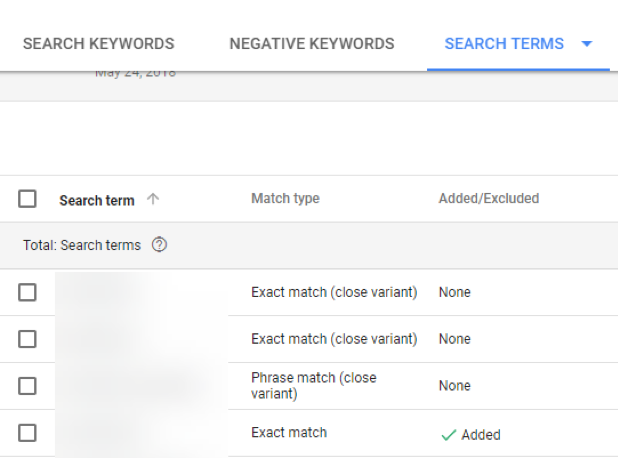
There are a lot of questions about what this change means, why it’s happening, and what can be done to uphold your PPC returns. This post aims at answering those questions, using input from experts within the PPC industry. Here’s what we’ll cover:
- A brief refresher on the search terms report in Google Ads
- What has changed in the search terms report and what it means
- An overview of how PPC experts are reacting
- PLUS actionable suggestions for navigating this shift
A quick refresher on the search terms report
The search terms report is a feature within your Google Ads account that allows you to see exactly which search terms triggered your ads to appear, as well as how closely those terms relate to the keywords your ad is targeting.
So if you have an ad targeting the keyword “farmhouse furniture” and someone searches for “farmhouse dining table,” the search term “farmhouse dining table” will appear in your search terms report, as with the example below:
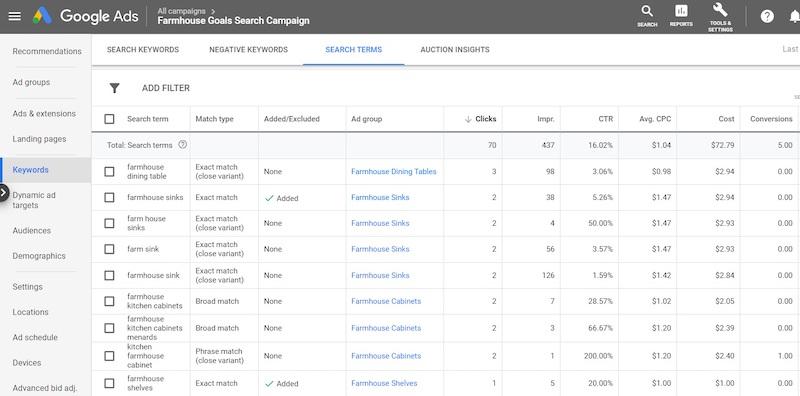
Source: Surfside PPC
Advertisers and agencies rely on this report to optimize their Google Ads performance. The data can be used to:
- Identify new search terms to add to your keyword lists.
- Build negative keyword lists
- Identify the best match type for particular keywords.
All of this helps ensure you’re allocating your budget properly, and not wasting ad spend on disinterested consumers and low-profit keywords.
How did Google change the search terms report?
Google announced on September 1, 2020 that as of September 2020, the report will now only contain search terms of a “significant volume”. It reads:
“Starting September 2020, the search terms report only includes terms that a significant number of users searched for, even if a term received a click. You may now see fewer terms in your report.”
What this means is, you will no longer be able to use this report to see all of the search terms triggering your ads. In particular, you will not see the search terms that have lower volume. Here is the Google Ads support page where the update is posted:
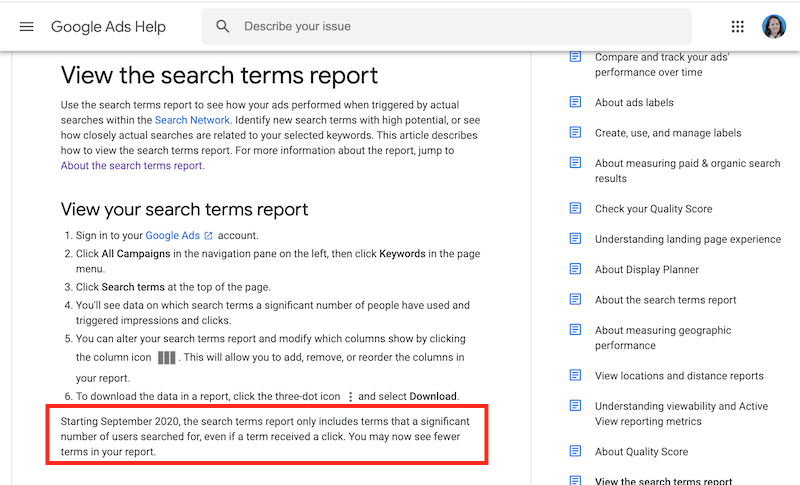
Source: Google
The impact of the STR change
One may think that low-volume, irrelevant keywords aren’t important—after all, they’re irrelevant. But every irrelevant click is ad spend wasted, and several low-volume terms can really add up.
The resulting reduced visibility into search queries has many advertisers disconcerted, as this report was paramount to Google Ads optimization.
- It inhibits small, proactive tweaks that can be made to plug what will amount to big leaks in spending.
- It makes keyword mining more difficult and renders broad match unusable.
- It leads to lower bidding and reduced conversion rates.
- It hinders the ability to create single keyword ad groups.
How PPC experts are reacting to the change
PPCs are not just disappointed with the limitations. A scroll through the Twitter #PPCchat hashtag reveals a common sense of indignancy and even outrage.

Source: @GregFinn on Twitter
Here is a brief summary of the perspectives being shared:
- While this change has been announced by Google as a way to adhere to privacy thresholds, many advertisers see this as a strategic and self-seeking move on Google’s part.
- This is just one of several recent changes making up a pernicious attempt by Google to reduce transparency and limit the power of advertisers.
- The resulting shift to auto bids, auto ads, and keyword-less bidding suggests Google is trying to give advertisers less control over their campaigns.
Brett McHale, paid media marketing expert and founder of Empiric Marketing, shares this sentiment:
“Google has continued its trend of reducing transparency for the purpose of its own bottom line. Not only has it taken measures to broaden match types across the board, but it is also now limiting your visibility into how you’re spending your money.
Advertisers will have to start using more exact match variations in order to ensure that they’re showing up for the most relevant queries possible—unless they are comfortable spending quite a bit of money to get an idea of where to optimize from broad and phrase match.
It all seems like a way for Google to make more money while reducing the advertiser’s ability to optimize, not to mention relentlessly encouraging automated bidding.”
How to respond to the search term report changes: expert takes and recommendations
We know we can’t stop Google from making these changes. And we know we can’t just stop PPC. So this begs the question, what can we do to uphold PPC returns for our businesses and our clients? We reached out to Mark Irvine, top PPC expert and Director of Paid Media at SearchLab, who provided his take on the matter and some recommendations on how to proceed.
This is a loss for advertisers
“Of the 3.5+ billion searches performed on Google every day, 15% of those searches have never occurred before. That’s 1 billion searches occurring for the first time on Google every day. A billion searches is certainly not insignificant, but if Google only reports back the search terms with a ‘significant’ number of users, this is the bare minimum amount of data we’re at risk of losing. Losing access to potentially more than 15% of the data advertisers rely on for optimizing their campaigns is significant, regardless of how you spin it.”
But you should continue optimizing
However, Irvine also makes a great point that this should not stop you from continuing optimizations:
“Advertisers shouldn’t let this loss of data interfere with their best practices. Even missing many of their unique search terms, the data Google will continue to share is the data that’ll help them make the most meaningful optimizations in their account. Adding one new negative keyword that prevents wasting 100 clicks on bad traffic is just as effective as adding 100 keywords that would waste 1 click each—with a fraction of the work. And too many advertisers aren’t taking those steps today on a regular basis—so don’t let the loss of some of your data prevent you from still working with what you still have, particularly if what you have is the most valuable data.”
Don’t let the loss of some of your data prevent you from still working with what you still have, particularly if what you have is the most valuable data.
Review your Bing search query report
Irvine then goes on to provide recommendations for older accounts and more seasoned PPC managers who will be hard hit by this change. For starters, try Microsoft Advertising tools:
“Both Google and Bing share similar search trends and your search campaigns will map out to new search terms in Bing. By regularly reviewing your search queries in Microsoft Advertising, you can optimize your Bing search campaigns while also finding new traffic that the search query report on Google is no longer showing you. From Bing’s search query report, you may easily be finding new keywords and negative keywords for Google as well.”

Launch Dynamic Search Ads to find new keywords
Irvine’s next recommendation is to launch Dynamic Search Ads:
“Dynamic search ads are great at targeting your ads based on the context of your landing pages and can ultimately help reach audiences for search terms that you didn’t cover with your keywords. Launching DSAs not only helps you cover your bases, but their search query reports can also help reveal where your traditional search campaigns have gaps in their keyword coverage.”

Dynamic Search Ads can help you identify keywords you may have missed.
Use Smart Bidding to optimize for “hidden” search terms
Even though we can’t see the data now, Google will still be using it to inform its own automated bidding feature. Irvine points out that “Much like many other signals Google keeps out of the hands of advertisers (Browser, iOS, past search history, search partner engines, etc), if we want to optimize for that data, we’ll need to consider letting Google optimize for this traffic with smart bidding strategies, such as enhanced CPC or target CPA.
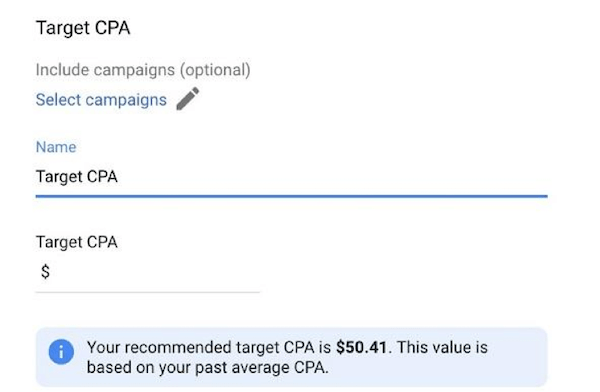
Diversify your skillset
One final recommendation is that if you’ve been solely focused on search engine ads, this may be a good time to start learning other viable digital marketing skills for business growth. These include social media ads management, data analysis, SEO, email marketing, website CRO, and more. Even better, there is a plethora of free online training courses to choose from.
Try Microsoft Advertising Intelligence
This tool is on our list of eight creative PPC strategies to succeed in today’s challenging landscape. You’d be surprised at how many new keywords you can mine. Learn all you need to know about keyword discovery with Microsoft Advertising Intelligence here.
Use these recommendations to navigate the Google ads search terms report change
There still remains a lot of unanswered questions around this change to the Google Ads search terms report. What exactly defines “significant?” How will this affeect paid search trends overall? Are there more changes to come? We will stay on top of any new updates that may further help you figure out the best way to proceed moving forward. In the meantime, try out the recommendations we’ve outlined in this post:
- Continue optimizing
- Use the Bing search query report
- Launch Dynamic Search Ads to find new keywords
- Use Smart Bidding to optimize for “hidden” search terms
- Broaden your skillset
Onward, PPC! And special thanks to Mark Irvine and Brett McHale for offering up their perspectives and insights.

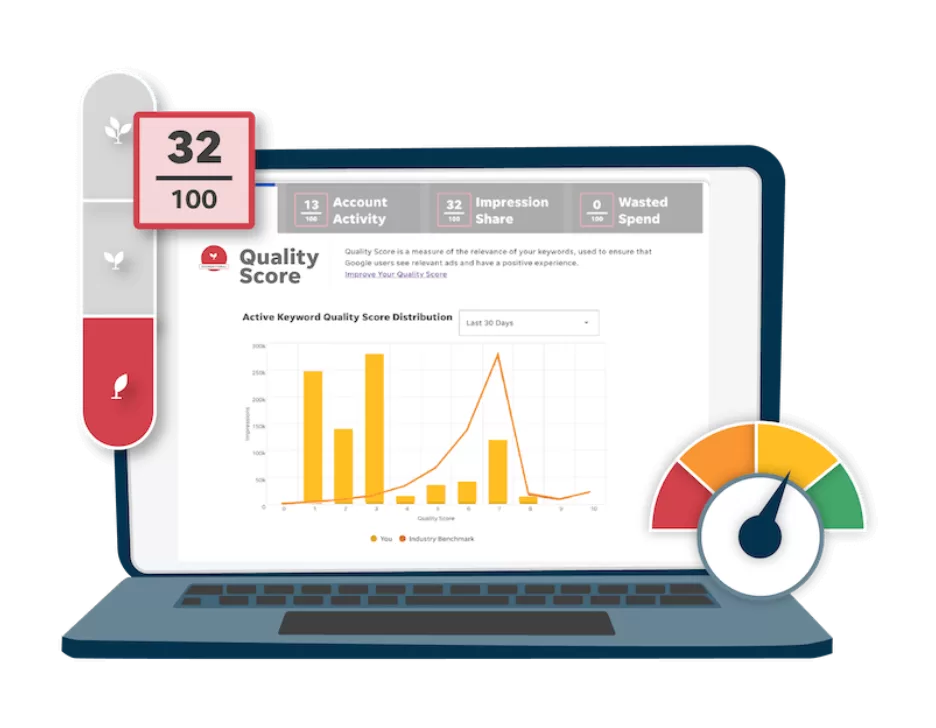

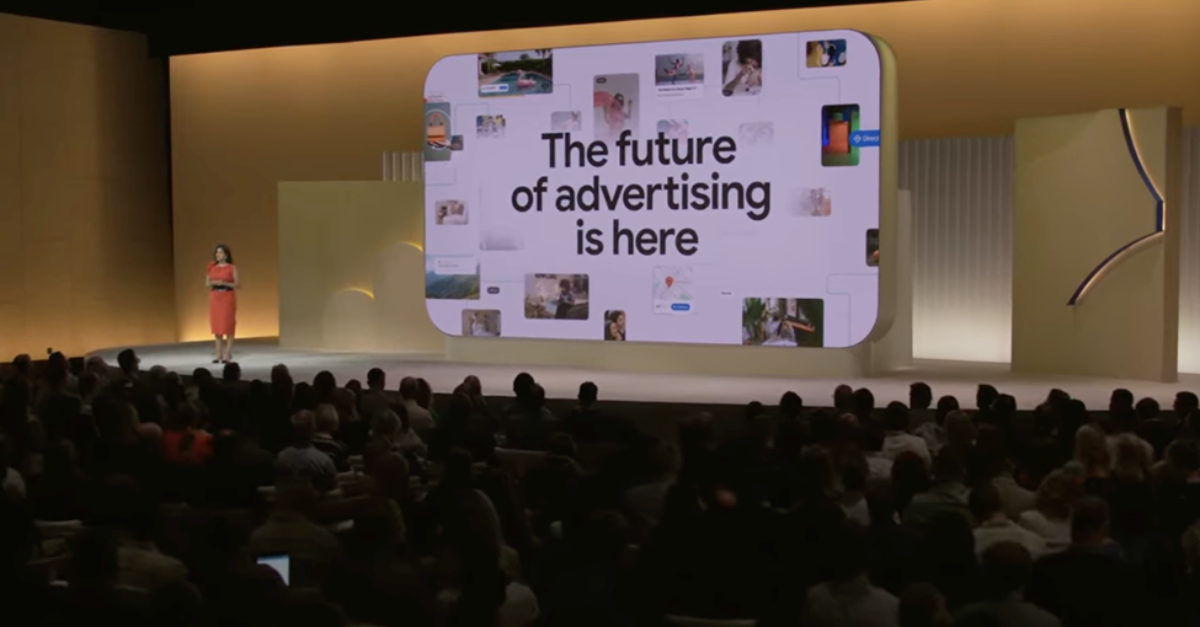
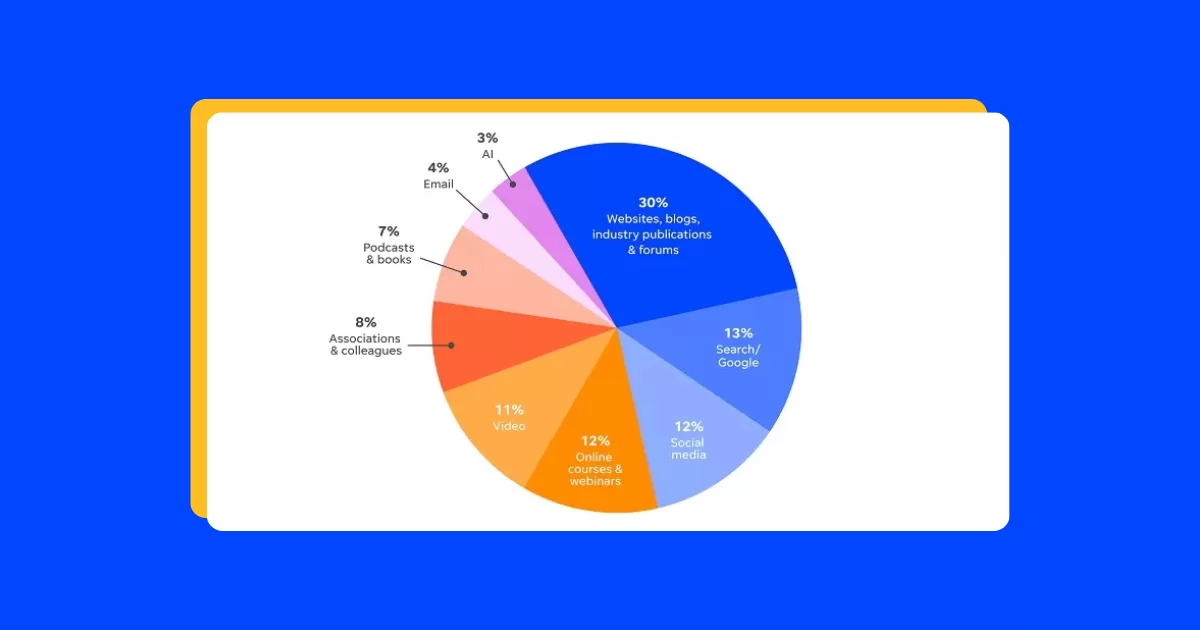
![Search Advertising Benchmarks for Your Industry [Report]](https://www.wordstream.com/wp-content/uploads/2024/04/RecRead-Guide-Google-Benchmarks.webp)


